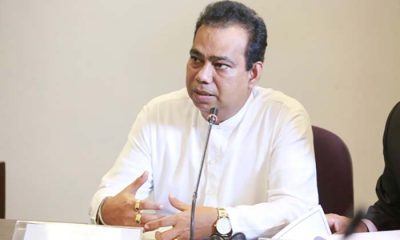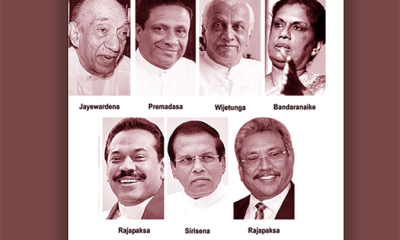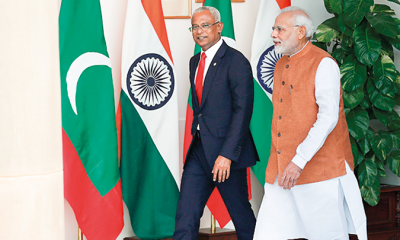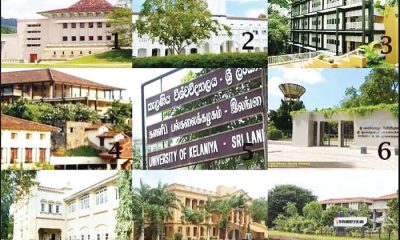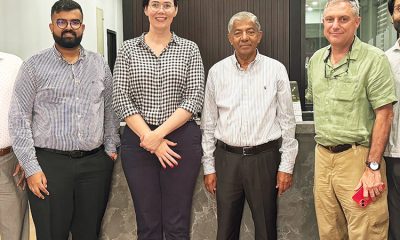Features
G-20 proclaiming one world; explosive whistleblowing

India is absolutely up front, worldwide. It was so buddy with the United States of America that Biden not only clasped hands firmly with Modi when receiving him some time ago in Washington DC but also put his arm round the Indian’s shoulders. Modi was given a red-carpet welcome though he was refused a visa to the US years ago when he was the Chief Minister of Gujarat due to religious violence in his state. Besides becoming one of the top economic powers of the world, India landed the Chandrayaan 3 in the South Pole of the Moon – a dark area with no sunlight falling on it.
G20 Summit
And another feather in India’s cap: India is hosting the 2023 meeting of Heads of State of the Group of Twenty (G20) in New Delhi on September 9 and 10. The attending Presidents and Prime Ministers will meet at the Bharat Mandapam International Convention Centre. The theme of the summit gathering is Vasudhaiva Kutumbakam, which means ‘The world is one family’. It is a Sanskrit phrase found in Hindu texts stating the Vedic tradition of accepting all human beings living on earth as belonging to one family. The theme of the G20 is similar: ‘One earth, one family, one future.’ Seeing the current state of the world of course, the inevitable comment is that we are far removed from the G20 theme.
One of the strongest leaders who shatter the meaning of the stated goal of the Group is Vladimir Putin who has informed India that he will be absent. He dared not attend the BRICS summit recently in South Africa due to the warrant against him filed at the International Criminal Court for war crimes. He will be represented at G20 by his Foreign Minister Seigei Lavrov. Also believed to be not attending is Chinese President Xi Jinping who will be represented by Premier Li Qiang. A growing alliance is strengthening itself between China and Russia with China being one of Russia’s biggest importers of oil and other commodities.
President Biden attends the major economic summit with the intention of promoting clean energy transition, the fight against climate change and increasing the capacity of multilateral banks to fight poverty. Macron, Federal President Frank Walter Steinmeier, Trudeau, Australian Anthony Albanese, Fumio Kishida, Crown Prince of Saudi Arabia are some of the other leaders in India as of today. Some are invited like the Prime Minister of Bangladesh. The Canadian PM expressed regrets that the Head of Ukraine has not been invited this year.
It would be interesting to hear and see how Rishi Sunak is greeted in New Delhi when he arrives this weekend. He looks smart Indian and probably has close relatives in India apart from his parents-in-law and wife’s people.
Another Indian politician?
This ambitious Indian is across the Atlantic. Vivek Ramaswamy is causing ripples if not waves in the presidential sea in the US of America by presenting himself as a Republican candidate to internally contest Trump and in the Party run, Biden. One hopes, even over here so far away from the States, that Trump will be debarred from contesting. He will never withdraw on his own accord; no conscience in the man to make him step down.
A friend sent me an article by Surinder Kaur titled “White Evangelicals aren’t sure about Ramaswamy. But for Indian American Christians, he is a no-go” which opens thus: “At 38 years old, Vivek Ramaswamy stands out among his fellow Republican presidential candidates for his age alone. The self-made billionaire has further set himself apart by saying he would ban social media for children, proposing to raise the voting age to 25, and espousing controversial views on 9/11. But when running a party with a strong evangelical Christian wing, perhaps his most unique characteristic is his Hindu faith, which Ramaswamy has proudly discussed.”
He grew up in Cincinnati and attended Catholic schools, his parents having migrated from Kerala. He says he has read the Bible multiple times. His wife, Dr Poorva Tewari, otolaryngologists and assistant professor at Ohio State University, believes her husband can change the world. He is a billionaire having gone into the pharmaceutical business with his Roivant Science establishment.
Truth revealed?
Cell phones have been awash (or should it read ‘invaded’, ‘intruded into’?) by clips and comments on Channel Four documentary on the Easter Sunday bombings of 2019. Cassandra supposes almost everyone has seen the video introducing the C4 documentary which has a shaven headed Niranjala …. weeping over her husband and three children killed in the Easter Sunday attacks. She laments they were her world and thus the message she has nothing at all to live for. There are many Niranjalas still mourning the wantonly wasteful and cruel killing of their innocent loved ones on Easter Sunday 2019 in three Roman Catholic churches and three five star hotels. A foreign businessman and his wife lost three of their four children at breakfast at the Shangri La Hotel. How utterly cruel and dastardly criminal to target people in prayer and happy holiday makers at breakfast. The LTTE massacred Muslims in a mosque in Kattankudy and bombed the Dalada Maligawa and shot at the Sacred Bo Tree in Anuradhapura.
Accusations have been made pointedly at those who supposedly wanted and positively promoted destabilizing the country with fear and insecurity by means of eight bomb blasts killing around 290 and maiming 500. And thus, after four years, a whistleblower is said to have blown the mystery of the hidden hand behind the Easter carnage; spilled all the beans. There had to be a mastermind or persons of power who wanted the country awash with insecurity; otherwise would his eminence Archbishop Malcolm Cardinal Ranjith keep levelling this accusation. We in our usual way have just pushed that tragedy away and go about our daily grind. Not so westerners who lost loved ones in the Easter Sunday massacre. They may press for getting to the bottom of the supposed conspiracy and see that justice is meted out.
There will not be a single person in the entire world, of course barring relatives and suckers, who will not rejoice if those guilty will be finally caught, accused and punished for the killing of nearly 300 people and injuring 500 and causing so much suffering in the minds of all others who mourned then and still feel for the victims of the Easter bombs. If you cause suffering, you have to suffer in this life itself, in addition to having your bad karma follow you through Samsara.
Relief bringing rain
The receding monsoon has brought some relief to our parched land, but has it rained over the worst sun-dried areas of the country? Cassandra was glad to read in this newspaper a couple of days ago an expert’s views on the prevailing drought and methods of conserving water like rain water harvesting. He mentioned also the benefit and need for desalination plants in Sri Lanka, which Cass has written about in previous articles, purely from a mere observer’s point ofview, but sensible.
Features
Deplorable Debt: Is Sri Lanka caught between IMF and IIF?

by Jayasri Priyalal
Jayasripriyalal59@gmail.com
The greatest challenges confronting the nation-states in the current era revolve around; deplorable debt, depleted natural resources, and degraded environment. Economic growth and future prosperity for all living beings are stalled due to the varying degrees of the 3D problems emerging out of ill-conceived policy divergences propelling the linear economic activities for centuries in many countries.
Sri Lanka hit its worst economic setback, since independence, in 2021, experiencing near bankruptcy short of a failed state. Still, the country is reeling from its socio-economic and political debacle without a clear visionary leadership putting the country on a recovery path. Showing resilience alone will not take us anywhere. Amongst many shortsighted policy debacles, including unmanaged debt without a semblance of fiscal discipline, remains unresolved. The unbridgeable mismatch between government revenue and expenditure is one such burning issue. Not a single political party, gearing for elections to secure political power, squarely addresses this challenge with viable options proposed.
Debt restructuring talks are dominating the media as the second IMF tranche of the Extended Fund Facility (EFF) with access to SDR 254 million (about US$337 million), subject to the IMF Executive Board’s review in due course.
Time, Information, and Power (TIP) are critical elements for persuasive Negotiations
The delegation from Sri Lanka for debt restructuring with the Official Creditor Committee (OCC) which consists of the majority of the private sector creditors, and sovereign bondholders, faces critical challenges. The author aims to highlight the various challenges and obstacles to unfold during the tough negotiations Sri Lanka faces in this essay. All Sri Lankans should endeavour to negotiate favourable terms in putting Sri Lanka’s debt on the path towards sustainable economic growth in a medium and long-term time frame.
As a nation, we should not burden those private creditors who hold our sovereign bonds, and it is our supreme responsibility to pay all our dues with reasonable compensation. Those who invested their money in Sri Lankan Sovereign Bonds are not at fault for the economic mismanagement of the corrupt politicians and their cronies. Sri Lanka, a sovereign nation, should take ownership to honour our commitments to settle all our creditors.
Unless Sri Lanka shows clear policy directions to revive and grow the stagnant economy, no one will be ready to put good money behind wasted bad money. Instilling trust and confidence in our ability to come up with viable and sustainable solutions to jump-start the growth of the economy is the way forward. This conditionality is paramount even to restructuring the existing debt instruments so that they can be traded in secondary markets to mobilize cash flows for stimulating the economic activities for growth.
In times of crisis, stakeholders are forced to sit and negotiate to find viable solutions, balancing the common and conflicting interests between the two sides. Hence, parties who sit down for negotiations are forced to deal with adversaries and not with friends or sympathizers ready to bargain to meet different expectations.
Time for Schock Doctrines
In an excessively financialized world cyclic financial crises are a common feature. Someone’s pain will always turn into another’s gain swiftly. The international financial system, consisting of private and public institutions, is well set to manage the crisis with the sole objective of privatization of gains and socializations of pains.
Many of their strategies anaesthetize weak policymakers looking for innovative and creative economic growth-led solutions to overcome the debt-burdened situations in the developing world. Capitalizing on this phenomenon, they force painful shock doctrines and austerities on the victims of financial crisis reversing all the socio-economic gains achieved thus far.
The classic example could be quoted from our own experience, currently, a quarter of Sri Lanka’s population is pushed below the poverty line. Moreover, the second IMF EFF assistance is a blessing in disguise for policymakers to hoodwink the public, especially on the eve of elections. Partners, with whom Sri Lankan Treasury and Ministry of Finance officials negotiate, are aware of the time-critical importance of this factor.
Media statements, following the various IMF official’s meetings, are loaded with praises but without any substance in handling the crisis for viable resolution. Instead, many are saddled in their comfort zone depending on further debt as the only recourse.
Pruning expenditure on social security and welfare, imposing unbearable income tax on the middle class – working poor – curtailing their purchasing power, reversing all progressive labour laws and regulations that mainstream inclusive growth and fairer distribution of wealth created in the economy, especially hampering the investment growth in the EPF, workers savings with arbitrary interest rate cuts, are some of the policy options concealed within the shock doctrine recommendations.
Aside from the above privatization of profitable State-Owned Enterprises was mismanaged by appointing cronies by the various governments, including appointing ‘yes’ men to serve the political interest, including in the banks, allowing the henchmen to rob the banks from inside. Commercially viable enterprises are loaded with debt, restraining them from coming out with any turnaround strategies.
And many national wealth is now offered on a platter for privatization as a remedial measure to the current crisis. These are part and parcel of the shock doctrine proposed to serve the interest of those foreign investors to grab the national wealth. A classic case, outsourcing the on-arrival visa issuance to tourists, at the BIA, to a private company hiking the visa fees at a disproportionate increase impacting the resilient tourism industry. On top of that, the private company charges US$ 18.50 as their fees on each tourist applying visa.
However, many economists, and advisors are keen to measure productivity gains, even at times of crisis, on factor inputs such as Labour, Land and Entrepreneurship, except Capital. At times of Financial Crises, private-public partnerships strongly advocate Quantitative Easing options as a remedy to maintain market stability by subsidizing the Capital Markets with zero and negative interest rates.
Those civic-conscious officials, consisting of the Sri Lankan delegation who sit for negotiations with the OCC, should bear in mind, for the sake of sustainability of the debt and stimulation of future growth in the economy, should not pass on the advantage of time factor to the opponents across the table. They need to put the country’s interest first, not to serve the interest of the bankrupt political propaganda, merely to deceive the electorate on the eve of elections.
Sadly, there isn’t any form of social dialogue between the policymakers, officials, private sector chambers, and academia to propose policy recommendations, at least, to identify and cut the avoidable expenditure in the parallel administration structures in the island state. A culture of meaningful stakeholder consultations before policy formulation is a must in the desired new system that Sri Lanka is aspiring for.
Information Asymmetry and the Role of the Institute of International Finance (IIF)
The second critical element that is vital in negotiations is information. In any negotiation process to achieve desirable goals all parties need to act in good faith and be fully informed of the facts and circumstances.
The Institute of International Finance (IIF) is a powerful organization that represents the interests of private creditors and financial institutions. IIF members include a wide range of financial firms operating globally in the sovereign debt markets, with common and divergent interests. The mission and basic lobbying position of the IIF are enshrined in its by-laws, namely, to be the most influential financial lobby organization at the international level that promotes voluntary market-based approaches to financial or debt crisis prevention and management.
According to Netherlands Amsterdam-based Stichting Onderzoek Multinationale Ondernemingen (SOMO), Centre for Research on Multinational Corporations) October 2021, report highlights serious imbalances in relationships between the IIF and private creditors, on the one hand, and the other hand public international and national financial decision-makers, parliamentarians, citizens, and other affected stakeholders. Furthermore, reports contend, that the IIF’s strategy leads to even higher indebtedness to private creditors and promotes a profitable sustainability-linked financial industry, which the IIF actively supports in the interest of its members. https://www.somo.nl/the-iif-debt-relief/
The Sri Lankan delegation needs to be aware of the advantages enjoyed by the counterparties with whom they negotiate. As per findings of the SOMO research, IIF membership covers the largest international financial conglomerates with common and diverse interests regarding sovereign debt of middle-to-lower income countries: from private and public Chinese banks and Wall Street investment banks to credit rating agencies, asset managers and hedge funds. Official authorities, like the IMF and World Bank, and even the central banks of some middle- and low-income countries, are IIF members.
On the one hand, this diversity of members involved in the international debt market can enable members more easily to exchange views and coordinate. On the other hand, members’ very diverse interests may block positions and solutions that are proposed in the IIF’s lobbying activities.
Lazard the French Asset Management company Sri Lanka consults for the debt restructuring and the law firm Clifford Chance both could be members of IIF, if so the conflict of interest between the parties will become a stumbling block in reaching a favourable solution to the benefit of Sri Lanka as highlighted in the SOMO report. This fact must receive the best attention of the Sri Lankan delegation to the negotiation, bearing in mind that no one subordinate could work for two masters’
honestly – the adage often quoted as a warning to be cautiously optimistic in similar circumstances.
Information is Power – Markets are good When you are on the Right Side
The third element that is crucial in handling negotiation effectively rallies around the power that the parties to the negotiation garner. Readers would understand better by the foregoing how the balance of power tilts between the parties to negotiations.
IIF is committed to protecting the interests of its members by lobbying for voluntary market-based approaches to financial or debt crisis prevention and management. Towards achieving these goals IIF functions with a few committees such as IIF Committee on Sovereign Risk Management (CSRM), G20 Debt Service Suspension Initiative (DSSI), IIF Debt Transparency Working Group (DTWG), IIF Emerging Markets Advisory Council (EMAC). They are very well equipped with data on capital market flows and debt situations in countries and markets across the region. IIF is committed to serving the interests of its members to spot investment opportunities and secure the assets with returns.
Following the recent rounds of negotiations with the Sri Lanka delegation with OCC, media reports revealed that in principle understanding was reached with a set of frameworks for further negotiations. Furthermore, there appear to be some discussions to extend the maturities with varying haircuts and interest rates reclassifying the Sovereign Bonds linked to either Macro or Governance parameters. We are forced to agree weighing the pros and cons to make the bonds marketable in the secondary markets to overcome the short-term constraints knowing how the Creditors team up to serve their interest.
Breaking the Vicious Debt Cycles – Focus on Growth instead of Distribution Sri Lanka is battling with the current crisis because of irresponsible borrowing and investment in wasteful projects. The Supreme Court has given a ruling pointing out the responsible policymakers and concerned government officials who contributed to the mismanagement of the economy. But it is good to remember stupidity is not a crime in the eyes of law, hence marginalized and vulnerable population sacrifice future prosperity for sins of the corrupt and greedy.
To offer a viable counter-proposal to the OCC at the next round of negotiations, the Sri Lankan delegation must be prepared with viable policy options that stimulate economic growth in the long-term enabling us to repay the debts and move away from the debt traps. To make that happen Sri Lankan policymakers will have to move away from popular distribution-led policy directives offered to deceive the electorate to growth-led directives for bottom up transformation.
A May Day promise by the President to increase the daily wage of Workers in Plantations to Rs. 1700 is one such gimmick. This writer fully supports the upliftment of the quality of life of the plantation workers. But that must come as a non-wage benefit as a form of social security measure, without destabilizing the plantation industry. There is enough money saved by the plantation workers in their EPF/ETF to be invested in such projects getting a reasonable return to sustain the viability of the fund. Such projects will serve the growth and distribution needs of the country.
Sri Lanka has been depending too much on the advice from the neo-liberal pundits aiming at realizing fake prosperities widening inequality in wealth, income, health, and education. We need to count on organic growth-focused economic policies and directives instead of synthetic short-term policies grappling with deplorable debt.
Facts, issues highlighted in the essay; assumptions made and actions proposed are to stimulate discussion and debate amongst the like-minded. Critics’ comments are welcome to encourage meaningful social dialogues among various stakeholders and policymakers to think of creative and innovative growth led options to overcome the eternal debt crisis.
Features
‘Mystery’ behind mindfulness: You become what you think

by Jeevani Senevirathne
Just the other day, at the University cafeteria while enjoying a cup of ginger tea, a good friend of mine happened to say, “Nowadays students are going through a lot of unnecessary turmoil and struggles due to the lack of self-awareness, and unfortunately, they attribute it to stress, anxiety and depression. And they end up swallowing pills for temporary relief. It’s true that compared to the past generations, these students are facing many challenges. But that doesn’t necessarily mean each one needs individual therapy and medication. Most of them only need an opportunity to increase their resilience”.
What you think, you become
What you feel, you attract
What you image, you create
Gautama Buddha
The above is the essence of Gautama Buddha’s teaching and one of the salient themes of the Dhammapada – mindfulness. Buddha has emphasised that human beings often live in a state of unawareness which is driven by desires, attachments, and distractions, that results in perpetuating suffering. The way we think and perceive the world around us eventually shapes our experiences and outcomes. Even though externalities undertake a central role in the play of life, the power of our thoughts and beliefs influences the ultimate reality – our reality. Hence, if one can get hold of his/her thinking process, then he/she can actually redo his/her personality and remake themselves.
What do you think – Can your thoughts manifest your actions?
Absolutely, your thoughts have a direct and powerful influence on your behaviour and the person you become. The thoughts we entertain in our mind shape our perceptions, attitudes, and beliefs, which ultimately guide our behaviour – the way we think about ourselves, others, and the world around us.
Our thoughts contribute to the formation of beliefs about ourselves and our capabilities by acting as self-fulfilling prophecies. Further, thoughts and actions are interconnected in a feedback loop – the Cognitive-behavioural loops. Hence, your thoughts influence your behaviour, and your behaviour can, in turn, influence your thoughts.
If you consistently have negative thoughts and hold self-limiting beliefs, such as “I’m not good enough” or “I can’t succeed” or “I will fail, be rejected, or encounter obstacles”, you are more likely to exhibit self-doubt and engage in self-sabotaging behaviours. Conversely, positive and empowering thoughts can foster self-confidence and to believe in your abilities which result in proactive actions, personal growth and increased chances of success.
Thoughts play a crucial role in setting goals and motivating us to take action. When we have clear and positive thoughts about what we want to achieve, it sets the direction for our behaviour while inspiring us, such as envisioning success, feeling passionate about a goal, or recognising the value in what we’re doing. And it also fuels our motivation to engage in certain actions.
When we consistently think in a certain way, our brain forms neural pathways that strengthen a pattern of thinking known as cognitive priming. And after sometime these well-established thought patterns become automatic and start to influence our behaviours without conscious effort.
Further, your thoughts not only influence your own actions but also affect how you interact with others. The thoughts you hold about individuals, situations, or groups can shape your behaviour towards them. Positive thoughts can lead to kindness, empathy, and cooperation, while negative thoughts can result in hostility, judgment, or avoidance.
It’s apparent that mindfulness is a superpower that everyone has access to, but only a few actually reach. Thus, the practice of mindfulness can create a mental space that facilitates the cultivation of positive thinking and intention. By becoming aware of negative thought patterns, mindfulness allows individuals to consciously choose positive thoughts and intents, aligning with the principles of the Law of Attraction.
The Law of Attraction, a concept popularised in the realm of personal development, suggests that the energy you radiate through your thoughts and emotions can influence the energy and experiences you attract into your life. Hence, positive thoughts and emotions can attract positive outcomes and opportunities. When you maintain a positive mind set, you are more likely to notice and seize positive possibilities, leading to a cycle of positive energy.
With that being said, how does mindfulness facilitate you as a young adult who is still schooling?
Adversity comes at us from the moment we are born. And as we grow, life becomes complicated and it naturally creates stressful situations for each and every one. Research on the effects of mindfulness interventions have shown that it directly contributes to the development of cognitive and performance skills in the young. When young pupils master the art of being in the ‘present’, they often become more focused and are able to approach situations from a fresh perspective by using existing knowledge more effectively.
Students often face academic pressures, deadlines, and various responsibilities that can lead to stress and anxiety. Mindfulness provides students with tools to mitigate stress by cultivating present-moment awareness and developing a non-judgmental attitude towards their experiences. Hence, they will be able to navigate setbacks, failures, and uncertainties with greater resilience and bounce back from difficulties more effectively to cater for the demands of their lives. Since mindfulness interventions have been directly associated with enhanced memory, cognitive flexibility, and problem-solving skills, by training the mind to reduce mental chatter, students can enhance their ability to retain and recall information easily, think creatively, and approach academic challenges with clarity.
Thus, by incorporating mindfulness into the daily routine of a student, he/she can cultivate a foundation of self-awareness, focus, emotional well-being, and resilience which will be of immense value for managing stress and anxiety, enhancing academic performance, and supporting personal growth that contributes to a positive and successful educational journey.
Although mindfulness results in calmness, self-appreciation, and personal growth while enabling you to be in control and getting in touch with your inner self, it’s not everyone’s cup of tea (most of the time). Due to a number of misconceptions people tend to intentionally avoid anything that has to do with mindfulness. Some perceive mindfulness as a religious or spiritual practice, or believe that it requires a significant time commitment or a specific lifestyle. This creates resistance or a lack of interest in exploring mindfulness further.
Since mindfulness encourages individuals to observe their thoughts, emotions, and sensations without judgment or avoidance, it creates an openness that evokes uncomfortable or difficult emotions that people prefer to suppress or avoid. Further, in today’s fast-paced world, many people feel overwhelmed with multiple responsibilities and it leaves them with little time for self-care or contemplative practices. Hence, individuals tend to perceive mindfulness as an additional commitment or gives low priority compared to other pressing tasks. In general, people have limited knowledge or exposure to mindfulness and its potential benefits. This lack of awareness results in discouraging or devaluing the practices of mindfulness.
If so, what can be done to enjoy the luxury of mindfulness?
As a point of departure, mindfulness has to be perceived not as a concept, but as a skill that develops with practice which enables a person to live in the moment by getting in touch with his/her consciousness that would facilitate in reducing stress and anxiety. Albert Einstein once said: “People like us who believe in physics know that the distinction between past, present and future is only a stubbornly persistent illusion”. Hence, we should try our level best not to let yesterday use up too much of today.
Carrying emotional baggage is not new to many of us. We need to acknowledge and accept the past, and learn to leave the past where it belongs, and stop stressing about the future as well. Further, our attention needs to be navigated towards the things that nurtures and sustains our life. Since, we experience life through our six senses and most of the time it’s the small and simple things that make the bigger picture, we need to be adept at appreciating every moment in life no matter how small or insignificant it might seem at first.
As a concluding remark, the practice of mindfulness should start with small and incremental steps. And it should be integrated into various aspects of your daily life steadily with serenity.
(The writer is Senior Lecturer, Department of Business Administration, Faculty of Management Studies and Commerce, University of Sri Jayewardenepura.)
Features
‘Charting a Sustainable Path: Navigating Challenges and Opportunities in Sri Lanka’s Plantation Sector – 2024’

by Lalin I De Silva
The recent wage increase for plantation workers has stirred significant discussion and debate within the industry, prompting a closer examination of the underlying factors at play. Several crucial points come to the forefront, shedding light on overlooked aspects that have contributed to the current predicament.
Firstly, the absence of a comprehensive job evaluation and analysis prior to implementing the wage increase is notable. Such an evaluation is essential for understanding the relative value of manual jobs on plantations. Without this foundational understanding, determining appropriate wage structures becomes challenging and can lead to unintended consequences.
Furthermore, there is a critical oversight in discerning whether the actual need is for higher daily wages or a livable wage. While the former may address immediate concerns, the latter ensures sustainable livelihoods for workers in the long term. Unfortunately, this distinction was overlooked in the decision-making process.
Historically, the plantation sector operated under distinct wage structures, including male/female daily wage rates and rates for non-able-bodied workers, established during colonial times for specific reasons. However, these systems were abolished for political reasons and replaced with a one-size-fits-all approach. The impracticality of this uniform approach has since become apparent, underscoring the importance of considering historical context and practical implications.
Moreover, the transition to collective bargaining, while intended to facilitate a give-and-take process, has often resulted in employers bearing the brunt of concessions. This imbalance highlights the need for alternative bargaining mechanisms, such as enterprise-level bargaining, which takes into account the diverse resources and needs of each Regional Plantation Company (RPC).
Adding to the complexity is the challenge of retaining and attracting workers in the face of hyperinflation. The erosion of purchasing power exacerbates existing grievances and further strains labor-management relations. Addressing these challenges requires a multifaceted approach that considers both short-term remedies and long-term sustainability measures.
In conclusion, the wage increase for plantation workers underscores the need for a more nuanced and comprehensive approach to labor management in the sector. By addressing historical precedents, reevaluating bargaining mechanisms, and prioritising sustainable livelihoods, stakeholders can work towards a more equitable and resilient future for all involved.
ATTRACTION & RETENTION STRATEGIES:A voluntary pension scheme with PHDT & SOCEBO to enhance workforce retention, which needs to be expedited by the state intervention. Real-time data on the plantation sector workforce is non-existent. We have to move into data-based decision making. This issue came to light when H.E. RW raised the question during a meeting with Crylon Planters Society asked for the number of employees and executives none could answer. This lack of accurate data is akin to the inaccuracies in national rubber production statistics as well.
The availability of real-time information is severely lacking. Brig Dr. Thiran De Silva, reachable at +94 (77) 392 9475, has proposed a solution utilizing Google Analytics. He has offered this solution to the Secretary, emphasising its urgency. Regarding productivity incentives, such as pluckers needing to harvest 20 kg/day and 600 kg/month, there shouldn’t be an issue with listing 30 names on the payroll even if the 600 kg are delivered ahead of the month-end. I raised this concern with the Commissioner of Labour two years ago, copying all relevant parties, but no action has been taken. Next,
Moving forward, it is imperative to address the challenges facing the plantation sector with a strategic and collaborative approach. Firstly, resolving the wage increase issue requires a comprehensive review of existing wage structures, taking into account historical precedents and practical considerations. Introducing alternative bargaining mechanisms, such as enterprise-level bargaining, can promote fairer labor-management relations and ensure that the diverse needs of Regional Plantation Companies (RPCs) are adequately addressed.
Additionally, the implementation of the Bonus Act: 1965 (India) presents an opportunity to enhance attraction and retention within the industry. This measure, if feasible, would not only benefit plantation workers but also contribute to the overall prosperity of the country.
Furthermore, improving Net Sale Average (NSA) is essential for enhancing the competitiveness of Sri Lanka’s tea industry. Collaborative efforts between industry stakeholders, such as the Sri Lanka Institute of Marketing (SLIM) and the Sri Lanka Standards Institution (SLSI), are crucial in developing certification criteria for high-quality Ceylon Certified Tea (Herbal Medicinal Beverage). Expedited action in this regard is imperative to capitalise on the market potential of premium tea products.
Moreover, as part of the Agri Modernisation Project, implementing value chain management initiatives can optimise efficiency and productivity across the plantation sector. Embracing global labor practices, such as “pay for performance,” can incentivise productivity while ensuring fair compensation for workers. The development of a “profit per hectare” index and personalized specifications of harvesters qualifying for the 1700/- wage rate can further enhance transparency and accountability in labour remuneration.
In conclusion, settling the wage increase issue amicably and implementing measures to enhance attraction, retention, and productivity in the plantation sector require collaborative efforts and proactive engagement from all stakeholders. By addressing these challenges comprehensively and strategically, Sri Lanka can secure a sustainable and prosperous future for its plantation industry.
(The writer is former Senior Planter, Agricultural Advisor and Consultant, Secretary General of Ceylon Planters Society, Editor of the Ceylon Planters Society Bulletin, and freelance journalist.)
-

 Features4 days ago
Features4 days agoSearching for Dayan Jayatilleka
-

 Business6 days ago
Business6 days agoINSEE Ecocycle marks 21 years of environmental excellence with a city cleaning program in Anuradhapura
-

 Sports6 days ago
Sports6 days agoUS visa issues deny Sri Lanka Olympic qualifying opportunity in Bahamas
-

 Features7 days ago
Features7 days agoCalling applications for MBBS!
-

 News2 days ago
News2 days agoLankan wins UK’s prestigious hair and beauty awards 2024
-

 News4 days ago
News4 days agoBIA thrown into turmoil as foreign firm handles on-arrival visa counter
-

 Features6 days ago
Features6 days agoWhy are SL universities’ positions low in world ranking indices?
-

 Business2 days ago
Business2 days agoUSDA Under Secy Taylor visits New Anthoney’s Farms and commends its pursuit towards sustainable poultry practices



